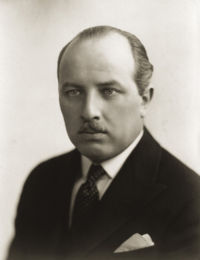
Kazys Bizauskas
Encyclopedia

Lithuania
Lithuania , officially the Republic of Lithuania is a country in Northern Europe, the biggest of the three Baltic states. It is situated along the southeastern shore of the Baltic Sea, whereby to the west lie Sweden and Denmark...
n statesman, diplomat, author, and one of the twenty signatories
Signatories of the Act of Independence of Lithuania
The signatories of the Act of Independence of Lithuania were the twenty Lithuanian men who signed the Act of Independence of Lithuania on February 16, 1918. The signatories were elected to the Council of Lithuania by the Vilnius Conference in September 1917 and entrusted with the mission of...
of the Act of Independence of Lithuania
Act of Independence of Lithuania
The Act of Independence of Lithuania or Act of February 16 was signed by the Council of Lithuania on February 16, 1918, proclaiming the restoration of an independent State of Lithuania, governed by democratic principles, with Vilnius as its capital. The Act was signed by all twenty...
.
Bizauskas first emerged as a writer while attending secondary school in Kaunas
Kaunas
Kaunas is the second-largest city in Lithuania and has historically been a leading centre of Lithuanian economic, academic, and cultural life. Kaunas was the biggest city and the center of a powiat in Trakai Voivodeship of the Grand Duchy of Lithuania since 1413. During Russian Empire occupation...
; he issued a hand-written periodical, Ateitis (The Future). He studied law at Moscow University from 1913 to 1915. After returning, he taught secondary school in Panevėžys
Panevežys
Panevėžys see also other names, is the fifth largest city in Lithuania. As of 2008, it occupied 50 square kilometers with 113,653 inhabitants. The largest multifunctional arena in Panevėžys is the Cido Arena...
. During the Conference of Vilnius
Vilnius
Vilnius is the capital of Lithuania, and its largest city, with a population of 560,190 as of 2010. It is the seat of the Vilnius city municipality and of the Vilnius district municipality. It is also the capital of Vilnius County...
he was elected to the Council of Lithuania
Council of Lithuania
The Council of Lithuania , after July 11, 1918 The State Council of Lithuania , was convened at the Vilnius Conference that took place between September 18 and 23, 1917. The council was granted the executive authority of the Lithuanian people and was entrusted to establish an independent...
as its secretary, and signed the Act of Independence in 1918.
In 1920 Bizauskas was elected to the Constituent Assembly as a representative of the Christian Democratic Party. During the summer of 1920 he served as secretary-general at the negotiations that led to the formalization of the Soviet-Lithuanian Treaty of 1920.
He held a number of diplomatic posts during the 1920s and 1930s, serving as Lithuanian envoy to the Vatican
Holy See
The Holy See is the episcopal jurisdiction of the Catholic Church in Rome, in which its Bishop is commonly known as the Pope. It is the preeminent episcopal see of the Catholic Church, forming the central government of the Church. As such, diplomatically, and in other spheres the Holy See acts and...
, the United States
United States
The United States of America is a federal constitutional republic comprising fifty states and a federal district...
, the United Kingdom
United Kingdom
The United Kingdom of Great Britain and Northern IrelandIn the United Kingdom and Dependencies, other languages have been officially recognised as legitimate autochthonous languages under the European Charter for Regional or Minority Languages...
, Latvia
Latvia
Latvia , officially the Republic of Latvia , is a country in the Baltic region of Northern Europe. It is bordered to the north by Estonia , to the south by Lithuania , to the east by the Russian Federation , to the southeast by Belarus and shares maritime borders to the west with Sweden...
, and the Netherlands
Netherlands
The Netherlands is a constituent country of the Kingdom of the Netherlands, located mainly in North-West Europe and with several islands in the Caribbean. Mainland Netherlands borders the North Sea to the north and west, Belgium to the south, and Germany to the east, and shares maritime borders...
. He also authored a secondary school textbook, contributed numerous articles to periodicals, and co-founded the Society of Bibliophiles and the publishing house Žinija. After the first Soviet occupation of Lithuania in 1940, he returned to his farm near Ukmergė
Ukmerge
-Early history:Ukmergė was first mentioned as a settlement in 1333. It was essentially a wooden fortress that stood on a hill, near the confluence of the Vilkmergė River and the Šventoji River. Ukmergė was attacked by the Teutonic Knights and the Livonian Order in 1333, 1365, 1378, 1386, and even...
, where he was arrested and held in prison until Nazi Germany declared war on the USSR on June 22, 1941.
Bizauskas disappeared during the summer of 1941 while being transported to a Soviet prison in Minsk
Minsk
- Ecological situation :The ecological situation is monitored by Republican Center of Radioactive and Environmental Control .During 2003–2008 the overall weight of contaminants increased from 186,000 to 247,400 tons. The change of gas as industrial fuel to mazut for financial reasons has worsened...
; he is presumed to have been shot along with a number of other prisoners.

